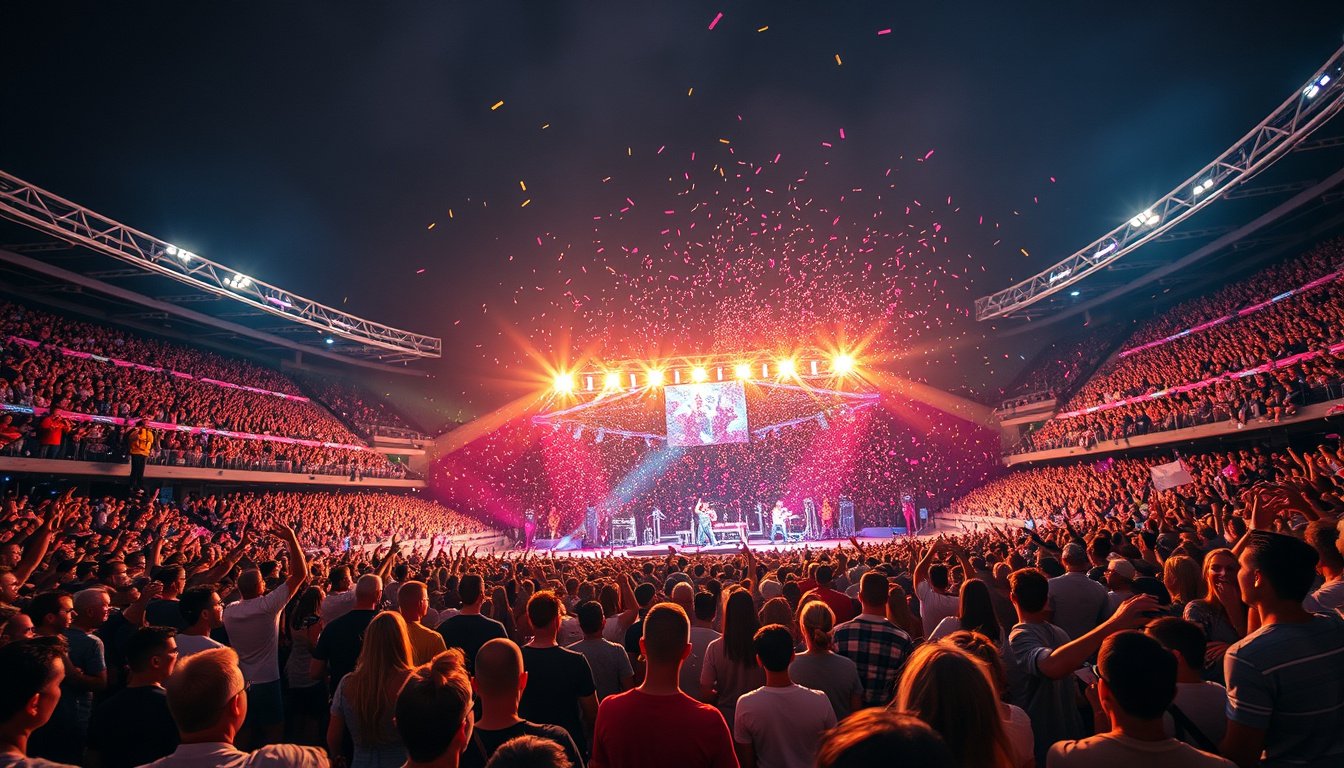Stadium concerts have long captivated audiences, drawing fans from all walks of life to experience the magic of live music in large, exhilarating environments.
With thousands of other fans, attendees share an energy that simply cannot be replicated through headphones or even smaller venues.
This article delves deep into the psychological and social dynamics at play when it comes to our fascination with these grand performances.
We will explore how live music events tap into our innate desire for connection while also examining the collective experience that makes attending a stadium concert a unique phenomenon.

Key Takeaways
- Stadium concerts provide an immersive experience that deeply satisfies our psychological need for connection through live music.
- The collective energy and shared excitement at large events enhance the enjoyment and memorability of the concert experience.
- Social dynamics play a significant role in our desire to attend stadium concerts, fostering a sense of community and belonging.
The Psychological Appeal of Live Music Events
The allure of live music events goes beyond mere entertainment; it taps into profound psychological needs of connection, energy, and collective experience.
Attending a concert provides an opportunity to escape the routine of daily life, allowing fans to immerse themselves in a sensory overload of sound and sight.
The live setting fosters a unique communal atmosphere, where individuals find belonging among fellow fans, ignited by the shared passion for the music.
Scientific studies reveal that the release of dopamine—a neurotransmitter associated with pleasure—during live performances contributes to the high levels of excitement and joy attendees experience.
Moreover, the interaction with artists, both on and off the stage, cultivates a deeper appreciation for the music and the performers, making fans feel connected to something larger than themselves.
This psychological appeal is a driving force behind the booming industry of live concerts, making them an integral part of modern culture.
For those interested in exploring this phenomenon further, Time Magazine delves into the science of why humans are fascinated with stadium concerts in their article here.
Understanding these psychological factors not only enriches our concert-going experiences but also highlights why these events will always hold a unique place in our hearts.
The Social Dynamics of Attending Stadium Concerts
Attending stadium concerts has become a cultural phenomenon, blending the thrill of live music with the electrifying atmosphere that only large venues can provide.
The social dynamics of these events play a pivotal role in shaping the overall experience, drawing diverse crowds from various backgrounds and locations.
From the pre-concert excitement as fans gather outside the venue to the shared exhilaration that ripples through the audience as the artists take the stage, the communal aspect of attending a concert is irreplaceable.
Music enthusiasts often form connections with strangers over shared favorite songs and experiences, highlighting the power of music to unite individuals.
Furthermore, social interactions are amplified by the scale of the event—fans often engage in group activities, partake in collective sing-alongs, and celebrate together, creating a sense of belonging and camaraderie.
As festivals and concerts evolve, they not only entertain but also serve as a platform for social interaction, reinforcing the significance of live performances in contemporary society.
For a deeper understanding of the social implications of these gatherings, check out [The Science of Why Humans are Obsessed with Stadium Concerts](https://news.google.com/rss/articles/CBMia0FVX3lxTE8xWmdmVWtodjl4QUdYSzNrVkFYSEdDajNEc3E2ZzQtMlIzdDRyQTZMaDJ3dl90M1NWWDJXZlYzT3l4aVhCcjdfUmRsVVFNV1RfUTM1Q0JvS3FSRGZtdGdlWkVDdGRUVWMyX0NB?oc=5) featured in Time Magazine.

